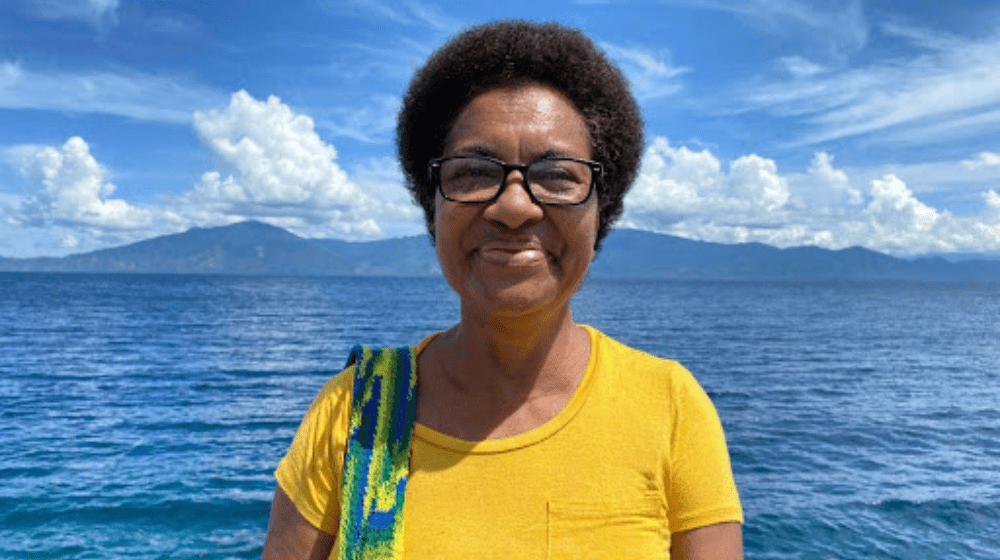“It’s not about me as a counselor, but always about the survivor”, Ana-Latu recounts her over twenty five years experience in providing services to gender-based violence survivors and delivering trainings on GBV in the Pacific region, in the capital city of Alotau and now at Tulau Service clinic in Milne Bay Province. As a counsellor for nearly two decades, she understands how critical it is for providers like herself to receive support to continue the challenging work they do.
UNFPA supports the government of Papua New Guinea to build the capacity of healthcare providers like Ana-Latu to meet the needs of survivors of gender-based violence. With support from Zonta International, and in partnership with the National Department of Health (NDoH), UNFPA runs case management and GBV trainings for service providers to enhance their knowledge and skills on how to care for GBV survivors, provide first line support, and support coordination of services so that the survivor is assisted in a safe and confidential manner, without retelling her experience.
The survivor comes first
“While providing counseling services, we must be very clear that it is about the survivor and never about us,” Ana-Latu shares. She explains that the beliefs and perceptions of the health care provider should never interfere with the needs of the survivor. “During the training we learned guiding principles – such as safety, confidentiality, non-discrimination and respect – that have been very helpful in our work and care of survivors of gender-based violence.”
When survivors affected by violence come to Tulau Counseling Service clinic, Ana-Latu and her team provide a safe space where they can share their stories. “They are usually overwhelmed by the abuse,” Ana-Latu explains, “and are feeling unsafe and insecure. They want to talk about their feelings, and we are here to listen.”
Through the survivor-centered training she received from UNFPA and Zonta, Ana-Latu came to understand the need to provide survivors with accurate information and options of services available so that they can are empowered to make their own choices. “Making decisions for survivors would be a way of disempowering them, asserts Ana-latu
The training also helped Ana-Latu to realize some of the errors she has made in the past and how she can better provide assistance to survivors of violence in the future. “[Before attending the training] I would assume things, which were probably not what the survivor wanted! Providers need to hold back and only ask ‘What would you like us to do?’ Making assumptions about what her needs are, is not survivor-centered support and care.”
The challenges of getting care
There are many factors that can keep a survivor of violence from seeking and getting help, and it’s an on-going challenge for service providers to address. The reasons may include fear of reprisals or revenge from the partner, fear of what the community may say, issues of shame and blaming, but also lack of information about services or challenges in accessing them. Once survivors come for health services, Ana-Latu makes sure to help them build their confidence as they receive care.
“We always remind survivors that whatever they are going through, it is never their fault. No matter what the circumstance, the responsibility always remains with the perpetrator.”
Privacy and security are also big issues in protecting survivors and making sure they feel safe. “In our culture,” Ana-Latu shares, “when anything happens, the community talks about it. So as case managers we must keep survivors’ stories private, as well as ensuring that their files are kept safe and stored securely.”
It’s not only survivors of gender-based violence who need to be concerned with their safety. Frontline workers also may face safety concerns.
“We, as providers, also need to take care of ourselves and think about the dangers we may face,” she reveals. “Our work can be risky, because the perpetrator may come after us. When we think about safety plans for survivors, we also need to think about our own safety plan.
Not defined by disabilities
“The training really opened up my eyes to a lot of things,” Ana-Latu tells us. “But one big thing that I learned was to be confident enough in my abilities to attend to a survivor with a disability. Before the training, I wasn’t really sure how to support them, but now I know, and I want to make sure not to contribute to any stigma or discrimination against them in any way.”
The gender-based violence guiding principles that were shared in the training teach providers to never discriminate, to always respect the dignity of the survivor, and to never define anyone by their disability. Supporting survivors with disabilities is a responsibility of GBV service providers.
A meaningful career
The work of a gender-based violence service provider is filled with many challenges and obstacles, and yet, after nearly two decades, Ana-Latu perseveres in her mission to help survivors. What makes all the hard work worthwhile to her?
“When a survivor opens up and tells her story to me, telling me that she now feels liberated and that a weight has been lifted from her chest – that is what makes me fulfilled. To see her walk away with a smile, knowing that I will walk with her until the end.”
Tulau Counseling Service is volunteer-based and many of its volunteers come through the mountains to the clinic to support survivors of gender-based violence and to provide life-saving care support. Commuting through the mountains is perilous journey as criminals often rob people on the route, but this does not deter the volunteers of Tulau Counseling services from their mission to save lives.


